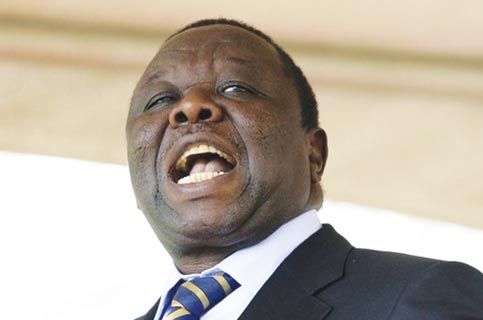
ZIMBABWE would not be mired in the unfolding economic and political crises if the South African government had not hidden a judicial report of the country’s 2002 election findings, a seething MDC-T president Morgan Tsvangirai said yesterday.
NQOBANI NDLOVU STAFF REPORTER
Tsvangirai said problems Zimbabwe was facing stemmed from a legitimacy crisis arising from stolen elections, which he described as “deadly military operations against civilians and the opposition”.
A South African judicial observer mission report of Zimbabwe’s 2002 elections compiled by a team of judges from that country was released on Friday, after a long battle with the Mail&Guardian newspaper.
The report concluded that the elections were not free and fair, and Tsvangirai said it was saddening that South Africa tried to hide the report, adding that this precipitated the country’s crises.
“Zimbabwe’s problems could have been solved in 2002 if this damning report had not been swept under the carpet,” he said yesterday.
“Only a return to legitimacy, through a truly credible election is the answer to all the problems afflicting the country.”
Tsvangirai said by hiding the 2002 Justice Kamphepe Report and declaring that election free and fair, South Africa was complicit in Zimbabwe’s crisis.
- Chamisa under fire over US$120K donation
- Mavhunga puts DeMbare into Chibuku quarterfinals
- Pension funds bet on Cabora Bassa oilfields
- Councils defy govt fire tender directive
Keep Reading
“Fraudulent elections have been at the epicentre of our national crisis because they seriously undermine legitimacy of leadership,” he said.
“The report comes as no surprise to us at all.
“We are deeply appalled by it and we unreservedly deplore what was done by the South African government to try to sweep this report under the carpet.”
Until last Friday, successive South African presidents — Thabo Mbeki, Kgalema Motlanthe and Jacob Zuma — had fought to ensure the Kamphepe Report remained a secret.

However, the Mail&Guardian fought a 12-year battle to ensure the publication of the report, revealing that the South African Judicial Observer Mission had adverse findings about Zimbabwe’s 2002 elections.
“To an extent, the spirited effort to hide this report shows that South Africa has wittingly or unwittingly aided the subversion of democratic processes in Zimbabwe, wantonly violating official Sadc guidelines on the conduct of free and fair elections, which they helped to create,” Tsvangirai said.
The former prime minister said the election report also aptly summarises the conduct of the 2013 elections, won by President Robert Mugabe and Zanu PF, but condemned by opposition parties as fraudulent. Zanu PF denies the charges and dismisses the opposition as sour losers.

“Reading their final verdict of the 2002 presidential election, the two judges may well have been talking about the July 2013 election, which was fraught with similar irregularities that they noted in their report,” he said.
“For us in the MDC-T, the respected judges’ verdict of the 2002 presidential election ought to have been the same verdict even of last year’s elections in this country. The report, while coming out 12 years after the election, makes poignant observations, which have continued to undermine the credibility of our successive elections since 2000.”
Meanwhile, Tsvangirai said Zanu PF was in the middle of a political storm with Mugabe’s imminent exit now unavoidable, as the ruling party had been hijacked by nonentities and opportunists.
He said Mugabe’s exit would create a political vacuum to be capitalised by buccaneers and nonentities, but it was ordinary people who would suffer the most.
“When the big man’s exit is unavoidable, what happens is that nonentities and opportunists take advantage because there is a political vacuum,” Tsvangirai said.
“What is happening in Zimbabwe is not different from what happened during Mao’s (Mao Tsetung, the late Chinese Communist leader) end days. Mao’s wife tried to take over leadership because Mao was dying and unfortunately, she did not succeed.”










